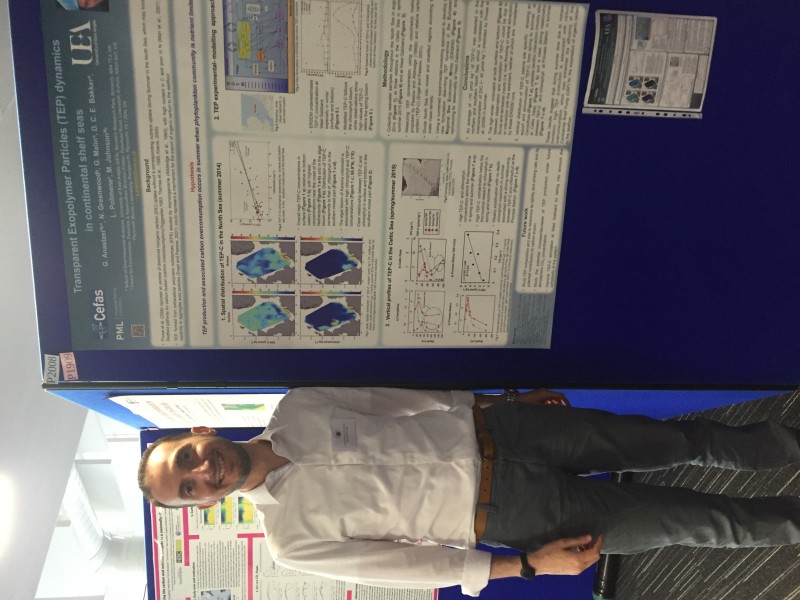Biennial Challenger Conference: Liverpool
Gianfranco Anastasi
UEA/CEFAS

First of all I would like to say thank you for the travel award; it gave the great opportunity of attending the 17th Biennial Challenger Conference held in Liverpool and presenting my poster on “Transparent Exopolymer Particles (TEPs) dynamics in the continental shelf seas”.
The first conference event I attended was the Icebreaker, held in the wonderful Victoria Gallery and Museum, which created a nice and friendly environment to meet all the conference attendees (PhD students and other scientists). The Icebreaker was an effective and informal way to meet scientists from different institutions and universities, and to find out about their current research and common research interests.
The conference was opened with a very interesting talk by Prof. Tim Lenton, and continued in the following days with a series of relevant talks from guest lecturers. All the talks were extremely interesting and with a high level of science, ranging from physical oceanography, marine biogeochemistry, observations and earth system models, up to biological processes.
Posters were displayed in the G-Flex room and main Atrium and were available for viewing during lunch breaks and at the allocated presenting slot. I presented a poster with the data collected during several cruises in the North Sea (Cefas) and Celtic Sea (SSB programme), along with some modelling work, using the European Regional Seas Ecosystem Model (ERSEM).I was also selected to give a one minute oral presentation of my poster during the lunchtime. This was a great chance to meet and interact with other PhD students interested in my research and with similar research aims.
On the Wednesday evening a social dinner was held at Liverpool’s Anglican Cathedral. It was another great opportunity to interact with other conference attendees and share delicious food along with a glass of good wine.
In conclusion, the conference helped me to meet other scientists from the UK and discuss my results in a nice and friendly environment.Furthermore it gave me the chance to get in touch with scientists (from the SSB programme and modelling community) and establish relationships for future scientific collaborations.
Profile:
I studied marine biology at the Marche Polytechnic University (UNIVPM), where I completed my master’s degree studying therole of local climate changes on organic matter inputs to the seafloor of the Catalan continental margin.
Following this I moved to Plymouth (UK) at the Plymouth Marine Laboratory (PML) where I worked on modelling. I used the coupled biogeochemical/hydrodynamic model(GOTM-ERSEM) to predict the seasonal evolution of biogeochemical variables and fluxes through theassimilation of in situ and remote sensed data.
In January 2014 I moved to Norwich (UK), where I started my Ph.D. in Environmental Sciences at the University of East Anglia (UEA),funded by Cefas, the Centre for Environment, Fisheries and Aquaculture Science. My goal is to address unknown keys in the continental shelf carbon pump (CSCP) related to the condition of “carbon overconsumption”. In particular I am investigating the role played by dissolved organic matter (DOM) and transparent exopolymer particle (TEP) production in the continental shelf seas during “carbon overconsumption”.
Latest News
Royal Society Publishing Photography Competition 2025
Please see a message from the Royal Society below:
We are delighted to announce that the 2025 Competition is now open for entries until 15 August for a chance to win £1000! The competition celebrates the power of photography in conveying the wonder of science happening all around us and photographs can be submitted in the categories of: Astronomy, Behaviour, Earth Science and Climatology, Ecology and Environmental Science, and Microimaging.
The competition is free to enter and open to anyone studying or working in science at graduate level or above. Category winners will receive a one-year membership to the Royal Photographic Society and the overall winner will receive a grand prize of £1,000. Find out more: https://bit.ly/RSPphotocomp
October 2025 MEDIN Workshop: Marine Data Management, Governance and the MEDIN toolset
The Marine Environmental Data and Information Network (MEDIN) are pleased to announce that registration is now open for the next occurrence of our popular free online training workshop: ‘Marine Data Management, Governance and the MEDIN toolset’ on the 13th – 17th October 2025 on OceanTeacher Global Academy.
Marine Data Management, Governance and the MEDIN toolset
The Marine Environmental Data and Information Network (MEDIN) and OceanWise are delighted to invite you to attend our popular free online training workshop: ‘Marine Data Management, Governance and the MEDIN toolset’ on the 19th – 23rd of May 2025.
